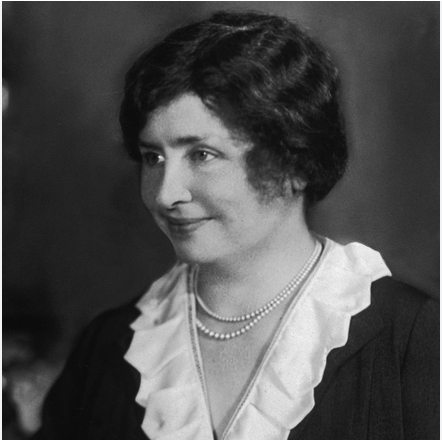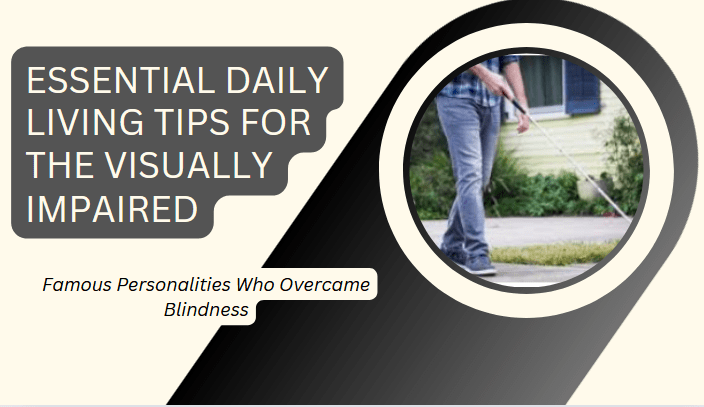The daily life of one who cannot see is a trying one where even something as simple as having breakfast, getting around the street or choosing what clothes to wear presents a problem. In essence, millions of visually impaired people around the globe know this reality all too well: they manage that they live with it. In this article, we shall be discussing the top 10 life-changing daily living tips for the visually impaired.
Although, the ability to master complex daily living skills can greatly improve personal autonomy and the individuals’ wellbeing. In this article, I will provide tips and skills towards independent living that the visually impaired can use as they go about with their daily activities.
- Top 10 diabetes management apps to simplify your life
- How technology is changing diabetes care management
Understanding the Challenges
I struggled with trying to come up with another layer to say, living with visual impairment is not easy, and here are some reasons why, just thinking about what visually impaired people go through in their daily life. What is obvious and easy in normal conditions becomes a challenge where it is about some sort of chess where you have to think of the next move.
From cooking and reading labels in the kitchen and the names of streets, or following the expenses, which are needed for daily activities, everything must be done with modifications.
That is why one of the greatest difficulties refers to the focalists’ capability to orient themselves within new environments on their own. Trying to board a bus or looking for a store in a crowded shopping mall would be nearly impossible, not to mention blind sighted.
They are as follows despite the rationality inherent in the process, each step involves planning and occasionally requesting help, which can be worrisome and undermine one’s independence.
Another general problem can be identified as concerns in using information. From flyers and leaflets to on-screen menus that nobody inclusively invited to read and from printed text all types of media to the content on the Internet for which nobody wanted to become an inviter.
This limitation Neglect can become frustrating and bring a feeling of isolation from the processes that seem to be a normal part of daily life to many.
- How a multifunctional fitness bench can transform your fitness routine
- Introducing the 6-in-1 electric head shaver for men
Overcoming Obstacles
From the guidelines provided above and your general knowledge of the disease, use the following helpful pointers to assist you in your daily life:
1. Organizational Strategies
This is the first on our list of top 10 life-changing daily living tips for the visually impaired.
• Sorting and Tagging – You can use text tags or even rewrite these tags by typing them with different colors of felt-tip markers, which will help you find what you need faster canned foods, clothes or medication at home.
• Structure – Possibilities may be created by structuring the lives of individuals with ID and incorporating tasks within their day to establish consistent routines. Try to use auditory signals such as time, alarms to bring yourself back into check.
2. Navigating the Environment
• Orientation and Mobility Training – Consider consulting experts in mobility for the blind to enhance the experience you are offering. These include the white cane or the guide dog in that one’s navigation skills would be greatly improved by their use.
• Learning Routes – Learn landmarks of key routes you usually take to and from work, for instance. When it is possible, create mental maps using landmarks or obstacles, and also use auditory cues and upgrade maps.
- 10 Natural beauty tips every woman needs for radiant skin
- 10 Proven anti-aging skincare secrets to look 10 years younger
3. Accessing Information
• screen Reader – This ability could entail using touching devices like the screen readers, magnifiers, and Braille displays to gain digital contents on one’s own.
• Reporting Procedures – Report places with poor accessibility or request information in formats like a movie with audio descriptions or menus of a restaurant in Braille. Most organizations offer these options on demand frequently asked questions these options are widely offered by many organizations.
4. Cooking and Meal Preparation
• Cooking Manipulations – Make use of talking appliances, or use some form of touch indicators on utensils to safely cook.
• Recipes and Ingredients – As a way of categorizing recipes, it is recommended that one organizes recipes in such a way that they can be easily accessed and viewed Shelley noted that the use of measuring cups with raised following the ability to view recipes in easily identifiable manner, Shelley recommended that one use measuring cups with raised marking in order to make portion control of the ingredients easy.
5. Managing Finances
• Labeling and Organization – Bodily touch can be used to label the bills and currency especially when organizing them at the point of sale.
• Independently managing money – Using Transportable banking applications or devices known as TDD containing tactile buttons and audio feedback for Digital Banking.
- Stop trying to lose weight, do this instead – biochemist
- Beat acne and prevent wrinkles: how food impacts our skin
Objection Handling: Dealing with 3 Major Frequently Encountered Issues
1. Delaying the development of new skills: Prominent among them is the assertion that it is too difficult to learn new skills now.
While it might be difficult to acquire new skills at any age, it is very important to acquire skills that will enable the disabled to live more independently since it is important to them and society.
It is also important for the learners to note that most of them may develop the feeling that they cannot handle some of the techniques, but with time and exercise, they discover that they were just elastic and that could be mastered easily.
2. They usually fear asking for assistance frequently and issues like ‘I am too embarrassed to always be asking for help’ are common amongst them.
However, the severity of the disability and the consequent needy position can be mitigated by independent acquisition of general living skills to minimize dependence on others. One of the best approaches can be categorized as organizational methods and using devices that help manage work on your own.
3. Some of the things that have been highlighted include; “I feel overwhelmed by all the adjustments that need to be made.”
It should begin with limiting itself to a single skill at a time and gradually extend its coverage to effectively embrace all the aspects of enhancing the learning process.
Hug your family, friends and caregivers, and embrace any kind of support from organizations and professionals dealing with visual impairment issues. This is not always the best way to go about it, you do not have to do it alone.
Embracing Independence
Daily living skills in the context of visual impairment means using different strategies learned in a creative process and with determination that new solutions can be found. The use of organizational skills, competent methods of navigation and exploration, assistive technology, and acceptance of resources that are easily accessible should help you to be more independent and improve on your quality of life.
Please bear in mind that every time you move a step forward to practice these techniques, you are taking a step closer to attaining increased self-sufficiency. It is vital that you surround yourself with other people who are going through this, mental health providers, friends and family you trust.
Working together for the greater good, we can make a difference in the life of so many people who strive to gain independence and self-sufficiency despite the impairments related to the state of their vision.
When you learn to manage independence, it is not only about learning how to deal with obstacles but, in essence, you are creating opportunities for the disabled. For a full life, begin today; harness the power to regain control of your life.
- How to eat your food in the right order to transform your health
- Vital reasons water intake is a necessity for diabetics
5 Famous Personalities Who Overcame Blindness
Still on top 10 life-changing daily living tips for the visually impaired, the stories of the following persons sent me into an inspiration high of triumph.
Try to picture what it would be like to wake up one morning and suddenly, your previously bright and illuminated existence has been reduced to complete blackness.
The simplest things, which one used to do freely such as meeting a beloved person and noticing his or her smile, reading a book, or simply watching the sunset become an incredibly distant illusion. Throughout experiences, blindness is usually a massive trial that demands a life overhaul from most people.
However, the world is full of stories of phenomenal people who not only deal with blindness but who conquer and achieve greatness, significantly contributing to human history. In this article, the audience will be presented with the real-life examples of personalities who faced blindness and are still remarkable examples of people who didn’t lose hope and never gave up.
It is as demanding in to the extent that one is socially, emotionally, and psychologically stuck, relying on a caregiver for his or her needs and having unsure about their next course of life. However, it is crucial to mention that behind the troubles there are always some people who fight bravely against all the obstacles.
These are not just inspiring but also serve the purpose of kindling the possibility of greatness from within ourselves.
Overcoming Obstacles: Inspiring Stories of men and women who understood daily living tips for the visually impaired and took advantage of it.
1. Louis Braille (1809-1852)

Louis Braille’s name identifies literacy of the blind. Robert Edeson was three-year-old when a tragic accident left him blind. However, with the initial failure, Braille did not relinquish his attempts in creating an efficient tactile language for the blind; Braille system that enabled the visually impaired individuals around the world in engaging in an effective reading and writing system.
Regardless of what one’s thoughts are toward this man, his creation is still a pillar of access and mobility of the blind today.
Open Loop:
This is a moving story of how Louis Braille, a man who was blind since birth but managed to build a marvelous invention that has made a significant impact in the world.
2. Helen Keller (1880-1968)

Helen Keller found daily living tips for the visually impaired person very useful and maximized it. She could well be termed as an example of woman who turned herself around, despite life’s challenges. Born a healthy child, Keller was struck by an illness of illness at tender age of one and a half years which rendered him deaf and blind.
Thanks to the efforts of her teacher Annie Sullivan, Keller was able to “speak” through finger signals and read Braille. She was able to rise and become an author, activist and lecturer in disability rights – fighting for the rights of PH people around the world.
Objection Handling:
Some might protest that Helen Keller being a dweller of mainland US and not a foreigner could perhaps, some say should – can be explained by her having a dedicated teacher. This is, however, a reality that Keller’s story demonstrates need for educational enlightenment and social support systems for the disabled.
3. Stevie Wonder (Born 1950)

This multi-talented star was born early and suffered from the effects of retinopathy of prematurity that resulted into blindness soon after his birth. Nevertheless, those who knew Wonder during his formative years will never fail to remember the trademark musical gift at a tender age.
He is a 25-time Grammy Award winner with countless super hits; he has as much right to freedom of speech as filmmakers and writers, moreover, he conducts social campaigns and actively engaged in charity.
Open Loop:
Reading Stevie Wonder biography of how he grew from being a blind child living in Detroit to a famous musician shows that nothing can really hinder one from achieving ones dreams if s/her passion is right.
4. Andrea Bocelli (Born 1958)

Andrea Bocelli performing live is memorable due to his deep, strong voice and his ability to convey strong feelings. Suffering from congenital glaucoma from birth, Luca’s eyesight deteriorated and he became blind at the age of twelve because of the soccer accident.
Yet, despite this, he never gave up on music and became one of the bestselling classical crossovers of all times. With his inspirational life narrative and more than a decade of unaltered performance, Bocelli proves the significance of determination and the impact of following one’s dreams.
Objection Handling:
One could presumably counter these points by saying that not everyone has the ability and/or chance to become an artist. This is, however, true; the story of Bocelli tackles the perseverance and the determination of looking for ways on how one can pursue one’s abilities and hobbies.
5. Erik Weihenmayer (Born 1968)

Erik Weihenmayer made a record when he scaled Mount Everest in 2001 despite being blind, and this involving created positive awareness around the world.
Born at Los Gatos, California, USA, Weihenmayer was diagnosed of retinoschisis at the age of fourteen, leaving him blind but with a fighting spirit that did not allow him to quit his adventurous dreams; and is still actively climbing; he has successfully achieved the Seven Summits, the highest mountains on all seven continents and is still active in speaking and advocacy.
Open Loop:
Blind cycling and other activities have come to illustrate that certain barriers are not as insurmountable as perceived, especially when there is enough courage to pursue those dreams.
Conclusion: Embracing Possibility
The others which have succeeded in life despite their blindness include Louis Braille, Helen Keller, Stevie Wonder, Andrea Bocelli and Erik Weihenmayer are some of the successful blind persons whose achievements tell us that blindness is not depriving an individual from what he or she wants to become in life. These are the people who took all their struggles as a chance of adapting themselves and thereby changing their lives and hence changing the world.
When people read or hear stories about other people and understand how they got there or what they accomplished, they also get to learn how strong and inventive the human spirit is. These stories of their lives are very inspiring and reveal the important aspects of people’s fight for their dreams, creativity, and worth of following one’s own goals.
These famous personalities prove that there is no room for limitation when it comes to a person with disabilities some has invent new and groundbreaking concepts, others created masterpieces of art, while others performed daring acts of courage.
Both individuals remain iconic, and their stories of triumph over adversities and hardships remain evident true that every single challenge can be achieved if one puts a positive attitude towards it.
- How to better improve hormones for fertility, PCOS and menopause
- Want to get pregnant? Try These 14 natural fertility boosters for women
Thus, sharing the stories of those great people, we should learn the values of their victories and promote diversity, compliance, and equity in regard to the requirements and restrictions for students with disabilities today. In combination, we will be able to fashion a world in which each and every citizen, no matter how different or disabled, has the opportunity to live in fulfillment of his potential.








